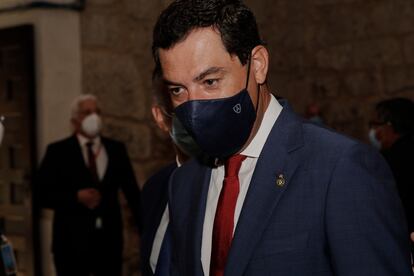Spanish city of Granada to face new coronavirus restrictions after long-weekend parties violate safety measures
Scenes of large groups crowded together without face masks in the early hours of Sunday morning come as the southern municipality records a spike in Covid-19 cases

The Andalusian regional government is set to announce new coronavirus restrictions in Granada after the city was overwhelmed by long-weekend parties for Spain’s National Day on October 12. In addition to the city’s 40,000 university students, who were enjoying their first long weekend since class began on September 21, Granada also received a wave of tourists, with 85% of hotel beds occupied. This led to drunken scenes in the early hours of Sunday morning, with up to 400 people walking through a central street without face masks and ignoring social-distancing measures. Police officers also received 300 calls reporting outdoor drinking sessions, known in Spain as botellones, and house parties.
The disorderly situation comes amid a spike in coronavirus cases in Granada, which is the only provincial capital in Andalusia that has a 14-day cumulative number of coronavirus cases that exceeds 500 per 100,000 inhabitants – one of the criteria for confinement under the Health Ministry’s new rules. In response to the scenes, Andalusian premier Juan Manuel Moreno said on Tuesday that the regional government will adopt “decisions that will place limits on university residences and in other areas.”

The incidence of the virus in Granada has risen significantly in the last 15 days – a spike the regional health department has linked to the start of the university year. Regional health chief Jesús Aguirre said last week that the new coronavirus cases were related to “student residents and residential colleges more than education centers.” To date, three coronavirus outbreaks have been linked to university residences in Granada: one with 68 cases, another with 23, which was reported last weekend, and another with 13, which was confirmed on Monday. The regional government’s delegation in Granada has confirmed that none of the three centers has been confined. In Granada, there are nearly 50 university residences, with each one a private entity with their own coronavirus protocols.
“Our protocols are very restrictive and we have shared many of them with other heads of residences, but if new measures are imposed, we will accept them,” says Javier Ortiz, the director of AMRO Granada, a university residence that has 354 spots but has not offered to use all its rooms to confine students who test positive for Covid-19.
The Andalusian government has not indicated what measures it will take – be it curfews on centers or reduced visits – but directors of university residences warn that they are not to blame. “Students have a life inside and outside of the residences. The images from this weekend did not happen at a residential college,” says Ortiz, who says most university students live in apartments – not in residences.
Juan Pedro Arrebola, an epidemiologist from the medicine faculty of Granada University, argues that “any measure that is applied in somewhere there is a risk of crowding, be it apartments or residences, is opportune.” But he adds: “There are more people concentrated in residences and it is easier to apply controls than in an apartment.” On the rise in cases, Arrebola explains: “The spread [of the coronavirus] is based on multiple factors, but in Granada, as well as university students, there is also a very young population, which means that there are more asymptomatic cases, and we don’t know what consequences this hotbed is going to have.”
In Granada, nearly 20% of the population is under the age of 20. “The average incidence of coronavirus among young people is 1,000 cases per 100,000 inhabitants, more than the 500 cases that we have reached,” explains Luis Salvador, the mayor of Granada, who has asked for the new restrictions not to affect mobility as has happened in the municipalities of Casariche in Seville, Linares in Jaén and Almodóvar del Río in Córdoba. The mayor also wants to avoid the perimetral confinement of Granada, a measure that was introduced in nine cities in the Madrid region under the state of alarm declared by the central government on Friday.
On the disorderly scenes seen over the weekend, Salvador says: “It coincided with bars closing and everyone left at the same time. As soon as the police arrived, people dispersed in around 20 to 25 minutes.” “The videos may give the wrong idea,” he explains, adding that eight in 10 police reports involved residents from outside Granada. The food and drink industry in the city, meanwhile, has proposed closing at staggered times to avoid crowding, but does not want restrictions on capacity or opening times, as has been introduced in the confined municipalities.
“Universities are as safe as any other place”
“It makes me feel embarrassed. I am sacrificing part of my life, I have changed my habits and then I see these images,” says Manuela, who lives in a family residence for students in Granada and preferred not to give her real name. “This [residence] is emptier than other years, many classmates from the province have preferred to remain in their towns this year as classes are only partly in person,” she says. On the possibility of new restrictions in university residences, Manuela is ambivalent: “Who is going to guarantee that we are all going to stay in our rooms? And that there is also going to a group of people in a closed space. It’s complicated.”
Around 60,000 students study at Granada University, 40,000 of whom come from outside of the city. According to the latest data published last Friday, the incidence rate of coronavirus among students at the university is just 0.3%. “University spaces are as safe as any other,” the university insists.
But Ortiz warns: “Young people are not aware of either the health or economic circumstances we are in. In Granada, we have to take measures, perhaps not the ones in Madrid, because the situation of the spread is different, but we have to act as soon as possible given the city’s young population and concentration.”
English version by Melissa Kitson.
Tu suscripción se está usando en otro dispositivo
¿Quieres añadir otro usuario a tu suscripción?
Si continúas leyendo en este dispositivo, no se podrá leer en el otro.
FlechaTu suscripción se está usando en otro dispositivo y solo puedes acceder a EL PAÍS desde un dispositivo a la vez.
Si quieres compartir tu cuenta, cambia tu suscripción a la modalidad Premium, así podrás añadir otro usuario. Cada uno accederá con su propia cuenta de email, lo que os permitirá personalizar vuestra experiencia en EL PAÍS.
¿Tienes una suscripción de empresa? Accede aquí para contratar más cuentas.
En el caso de no saber quién está usando tu cuenta, te recomendamos cambiar tu contraseña aquí.
Si decides continuar compartiendo tu cuenta, este mensaje se mostrará en tu dispositivo y en el de la otra persona que está usando tu cuenta de forma indefinida, afectando a tu experiencia de lectura. Puedes consultar aquí los términos y condiciones de la suscripción digital.









































